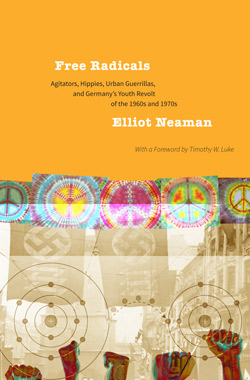Ten characteristics of the patterns of ethnic conflict in Europe—the way they are reflected in media and culture. They serve as the key to conceptual understanding of the nature of confrontation, aggression in communication in the public sphere in Europe at present, and erosion of democratic values
|
“From the summer until November 1969, Baader and Ensslin threw themselves into their project with enthusiasm and were soon put in charge by the naïve and often intimidated authorities. Under Baader and Ensslin’s guidance, around forty girls and boys (nicknamed ‘picos’) fled Staffelberg, and runaways from various other juvenile centers soon joined them. They found sanctuary in various and sundry apartments in the Frankfurt area, arranged by local activists. Baader and Ensslin staged ‘go-ins’ in the offices of the nervous bureaucrats who ran the homes and succeeded in convincing the experts to make changes to the living conditions before the young residents would promise to return. Baader and Ensslin were given power to manage the five DM cash allotment for each youth, which turned out, unsurprisingly, to be a bad mistake…” Elliot Neaman’s Free Radicals: Agitators, Hippies, Urban Guerrillas and Germany’s Youth Revolt of the 1960s and 1970s is now available for purchase in our online store. Save 20% on the list price by using the coupon code BOOKS20 during the checkout process. Also available in ebook format at Amazon.com (Kindle) and Barnes & Noble (NOOK). Free Radicals
Elliot Neaman’s Free Radicals presents a comprehensive panorama of the West German youth revolt in the 1960s, as well as its subsequent fragmentation and descent into terrorism in the 1970s. Neaman argues that the activists of the 1960s fundamentally misconstrued the nature of the young German republic, conflating it with earlier problematic German polities, and offered hazy world-shattering utopias to replace it based on artificial historical comparisons. The student radicals at first were swept along by liberalizing forces, but then made a decisive turn against reform in favor of an aggressive rejection of the existing order. Coming on October 1st: Elliot Neaman’s Free Radicals: Agitators, Hippies, Urban Guerrillas and Germany’s Youth Revolt of the 1960s and 1970s. Pre-order your copy in our online store, and we will ship it once it is available. Save 20% on the list price by using the coupon code BOOKS20 during the checkout process. Free Radicals
Elliot Neaman’s Free Radicals presents a comprehensive panorama of the West German youth revolt in the 1960s, as well as its subsequent fragmentation and descent into terrorism in the 1970s. Neaman argues that the activists of the 1960s fundamentally misconstrued the nature of the young German republic, conflating it with earlier problematic German polities, and offered hazy world-shattering utopias to replace it based on artificial historical comparisons. The student radicals at first were swept along by liberalizing forces, but then made a decisive turn against reform in favor of an aggressive rejection of the existing order. Mina Ahadi is an Iranian exile, living in Germany. She opposed the Shah as well as Khomeini. In 1990 she fled to the West. An adamant secularist, critical of all religion and therefore an opponent of Islamist politics, she does not appear to distinguish between “Islamic” and “Islamist” in her prose. She identifies herself as a communist, she is a leader in the “Central Committee of Former Muslims,” and she is a principled defender of human rights. In two recent open letters, she stakes out positions that not only provide insight into contemporary German political discussions but that are directly relevant to U.S. debates as well. This is the fourth in a series of posts that introduce the thought of historian Martin J. Sklar, as a prelude to a print symposium on his life and work in a future issue of Telos. Earlier excerpts of Sklar’s writing appear in the first, second, and third posts. For a fuller introduction, refer to the head note to the first TELOSscope post. As a researcher, Sklar was a historian of the United States, including its role in the world, particularly (from the late nineteenth century) as a promoter and guarantor (on balance) of a global system of expanding economic and political freedom. As a reader and informed commentator on international affairs, he was also deeply interested in broader issues in world history, particularly insofar as they shaped contemporary global conflicts. (Among the several dozen of Sklar’s books that I inherited are heavily marked and annotated copies of the following: John Yoo, War by Other Means: An Insider’s Account of the War on Terror; Philip Bobbitt, Terror and Consent; Bernard Lewis, The Middle East: A Brief History of 2,000 Years; and Niall Ferguson, Colossus: The Rise and Fall of the American Empire.) The following excerpts from a letter to John Yoo reflect Sklar’s evolving understanding of what he understood as an ongoing U.S. (and Western) war against Islamic imperialism. Of particular interest is his conceptualization of various sectarian, and even nominally secular, movements as sometimes-competing branches of an expansive, totalitarian movement. |
||||
|
Telos Press Publishing · PO Box 811 · Candor, NY 13743 · Phone: 212-228-6479 Privacy Policy · Data Protection Copyright © 2024 Telos Press Publishing · All Rights Reserved |
||||








